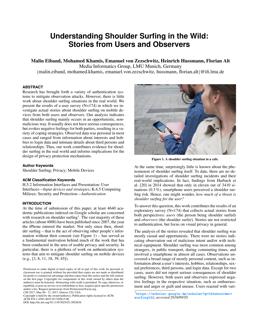Research has brought forth a variety of authentication systems to mitigate observation attacks. However, there is little work about shoulder surfing situations in the real world. We present the results of a user survey (N=174) in which we investigate actual stories about shoulder surfing on mobile devices from both users and observers. Our analysis indicates that shoulder surfing mainly occurs in an opportunistic, nonmalicious way. It usually does not have serious consequences, but evokes negative feelings for both parties, resulting in a variety of coping strategies. Observed data was personal in most cases and ranged from information about interests and hobbies to login data and intimate details about third persons and relationships. Thus, our work contributes evidence for shoulder surfing in the real world and informs implications for the design of privacy protection mechanisms.
Publication
 |
Malin Eiband, Mohamed Khamis, Emanuel von Zezschwitz, Heinrich Hussmann and Florian Alt. Understanding Shoulder Surfing in the Wild: Stories from Users and Observers. In Proceedings of the 2017 CHI Conference on Human Factors in Computing Systems. CHI '17. ACM, New York, NY, USA. [Download Bibtex] |